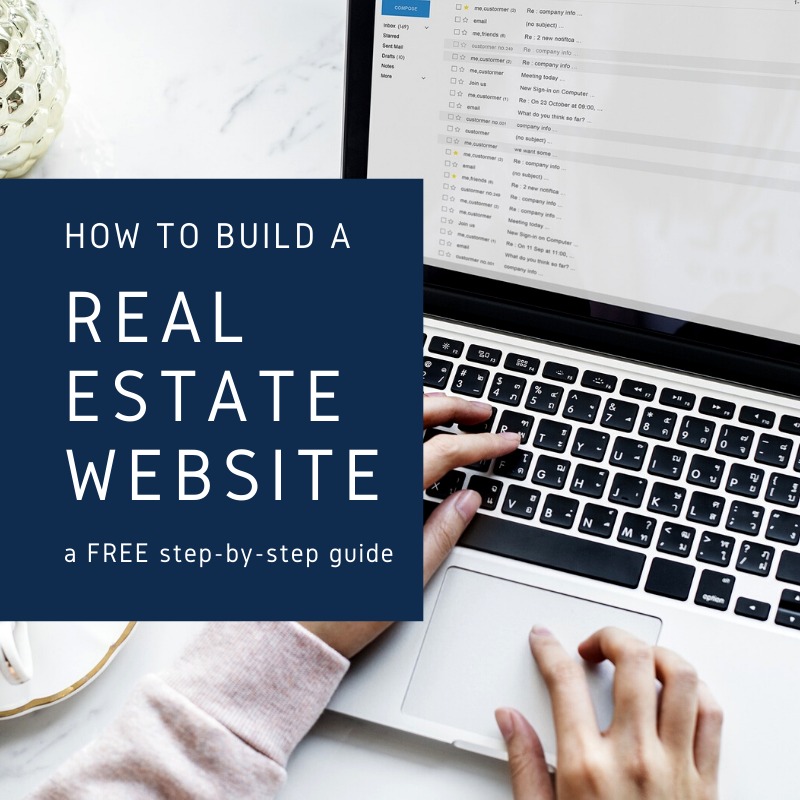Are you a real estate agent looking to create a powerful online presence? I can help! I know a bit about how to build a website for real estate agents. In fact, I literally wrote the guide on it!
In today’s digital age, having a well-designed and optimized website is crucial for success in the real estate industry. Your website is essentially your virtual storefront, displaying your listings and services to potential clients 24/7. But what features should you include on your website to attract and convert visitors into clients?
In this article, we will explore the 10 essential features that every real estate agent’s website needs. From eye-catching property listings and informative neighborhood guides to lead capture forms and mobile optimization, we will dive deep into each feature, highlighting its importance and providing practical tips for implementation.
Whether you are a seasoned REALTOR or just starting out, this comprehensive guide will help you create a website that stands out in a competitive market. So get ready to enhance your online presence and boost your business with these must-have features. Let’s get started!

Why It’s Important to Build a Website – for Real Estate Agents
Having a website is no longer a luxury but a necessity for real estate agents. It provides a platform to showcase your expertise, build trust, and establish yourself as a reputable real estate professional. With the majority of homebuyers and sellers starting the real estate sales process online, a well-designed website can significantly increase your visibility and reach. Additionally, having a website allows you to track and analyze your online presence, enabling you to make data-driven decisions to improve your marketing strategies.
Having a website not only enhances your credibility but also allows you to differentiate yourself from your competitors. It provides a centralized hub where you can showcase your listings, share valuable content, and engage with potential clients. A professional website helps you build a strong online presence, making it easier for potential clients to find and connect with you. By investing in a well-designed website, you are investing in the future success of your real estate business.
10 Essential Features When You Build a Website for Real Estate Agents
Essential Feature #1: User-Friendly Navigation
Your website should be easy to navigate, allowing visitors to find the information they are looking for quickly and effortlessly. A cluttered and confusing navigation menu can lead to frustration and cause potential clients to leave your website.
To ensure a seamless user experience, organize your navigation menu logically and categorize your content into clear sections. Use descriptive and concise labels for your menu items, making it easy for visitors to understand what each section contains. Consider implementing dropdown menus to further simplify navigation. Additionally, include a search bar at the top of your website to allow users to search for specific content.
Remember, the goal is to make it as easy as possible for visitors to find what they are looking for and encourage them to explore more of your website. A user-friendly navigation menu will not only enhance the overall user experience but also increase the chances of converting visitors into leads.
Essential Feature #2: Featured Listings
Your website is a way to market yourself. And listings are one of the best ways to show potential clients what type of properties you represent.
While some real estate coaches insist that agents need an IDX function that allows buyers to search MLS listings, I respectfully disagree. In my experience, buyers have been well-conditioned to go to sites like Zillow, Trulia, Realtor.com, or Homes.com. They are unlikely to go to a single agent’s website to browse listings. Additionally, IDX integration can be expensive and difficult to set up without a tech expert.
But by entering your current listings (and perhaps recent sales), you’ll be able to show off your track record to those who visit your site.
Essential Feature #3: Mobile Responsiveness
In today’s mobile-driven world, having a mobile-responsive website is essential. With the majority of internet users accessing websites on their cell phones and tablets, your website must look and function seamlessly across different screen sizes. A mobile-responsive website adapts to the user’s device, providing an optimal viewing experience.
To ensure your website is mobile-responsive, consider using a responsive design theme. Or work with a web developer who specializes in mobile optimization. Test your website on various devices and screen sizes to ensure that all elements are displayed correctly and that the navigation is intuitive.
A mobile-responsive website not only improves the user experience but also has a positive impact on your search engine rankings. Search engines like Google prioritize mobile-friendly websites, and having a mobile-responsive website can improve your visibility in search results. Don’t miss out on valuable leads and potential clients by neglecting mobile optimization.
Essential Feature #4: High-Quality Images and Videos
When it comes to real estate websites, a picture is worth a thousand words. High-quality property images and virtual tours can significantly impact a visitor’s perception of a listing and influence their decision to inquire further. Investing in professional photography and virtual tour technology is essential to showcase your listings in the best possible light.
Ensure that your property images are high-resolution, well-lit, and accurately represent the property. In most markets, hiring a professional real estate photographer is a smart investment.
Virtual tours provide an immersive experience that allows potential clients to explore the property from the comfort of their own homes. Virtual tours can be created using specialized software or by partnering with a virtual tour provider.
By incorporating high-quality property images and virtual tours into your website, you are providing potential clients with a realistic and engaging preview of each listing. This can significantly increase their interest and encourage them to take the next step towards becoming a client.
Essential Feature #5: Testimonials and Reviews
Testimonials and reviews are powerful tools for building trust and credibility. Including testimonials and reviews on your website allows potential clients to see what others have experienced when working with you. Positive reviews and testimonials can greatly influence a visitor’s decision to contact you and can help you stand out from your competitors.
To effectively showcase testimonials and reviews, create a dedicated page on your website where you can feature client testimonials. Include the client’s name and a brief testimonial highlighting their positive experience. Getting permission to post a photo of the clients and/or link to their social media profiles can make the reviews even more effective by offering additional validation of their authenticity.
Additionally, consider integrating review platforms such as Google My Business or Yelp on your website. This allows visitors to see reviews from a variety of sources and adds an extra layer of credibility to your online presence.
Remember, testimonials and reviews act as social proof and can significantly influence a visitor’s decision to trust and work with you. Incorporating these features into your website can help you build a strong reputation and attract more clients.
Essential Feature #6: Lead Capture Forms
One of the most effective ways to capture leads on your website is by including lead capture forms to build your mailing list. These forms allow visitors to provide their contact information in exchange for valuable downloadables (such as property listings, market reports, or real estate guides), which are commonly called lead magnets.
To optimize your lead capture forms, keep them simple and easy to fill out. Include fields for the visitor’s name, email address, and phone number.
Place your lead capture forms strategically throughout your website, including on property listing pages, blog posts, and landing pages. Use compelling call-to-action buttons and persuasive copy to encourage visitors to take action and submit their information.
The goal is to capture leads and nurture them into clients. By integrating lead capture forms into your website, you can build a database of potential clients and stay in touch with them through targeted marketing campaigns.
Essential Feature #7: Blog and Content Marketing
Content marketing is a powerful strategy for attracting and engaging potential clients. By creating valuable and informative content, you can position yourself as an expert in your field and provide answers to commonly asked questions. The best way to implement content marketing on your website is by having a blog.
A blog allows you to regularly publish articles, guides, and tips related to real estate. It provides an opportunity to share your knowledge, insights, and expertise with your audience. By consistently producing high-quality content, you can drive traffic to your website by increasing your visibility in search engine results. The more content you give Google to index, the more likely Google is to recommend your site to users when they search for certain topics.
When creating a blog content calendar, focus on topics that are relevant to your target audience. Consider writing about local market trends, home-buying tips, neighborhood spotlights, and home improvement ideas. Use keyword research to identify topics that are popular among potential clients and optimize your blog posts for search engines.
Remember, content is king. By investing time and effort into content marketing, you can attract and engage potential clients, build trust, and establish yourself as a go-to resource in the real estate industry.
Essential Feature #8: Integration with Social Media Platforms
Social media has become an integral part of our daily lives, and leveraging its power can greatly benefit your real estate business. Integrating your website with social media platforms allows visitors to easily connect with you, share your content, and stay updated on your latest listings and news.
Include social media icons on your website, linking to your profiles on platforms such as Facebook, Instagram, Twitter, and LinkedIn. This allows visitors to follow you on social media and engage with your content. Additionally, consider incorporating social sharing buttons on your property listings and blog posts, making it easy for readers to share your content with their networks.
Remember to regularly update your profiles with relevant and engaging social media content. Share your blog posts, property listings, market updates, and other valuable resources. Engage with your audience by responding to comments and messages promptly. Social media can help you reach a wider audience, build brand awareness, and generate leads.
Essential Feature #9: Contact Info and Inquiry Forms
Providing clear and easily accessible contact information is essential for converting website visitors into clients. Include your phone number, email address, and physical address prominently on your website. Consider including a contact form on your contact page, allowing visitors to send inquiries directly from your website.
Make it as easy as possible for potential clients to get in touch with you. Display your contact information and inquiry forms on every page of your website, preferably in the header or footer. Additionally, consider implementing live chat functionality to provide instant support and answer any questions visitors may have.
Respond to inquiries promptly and professionally. A quick response time and excellent customer service can greatly impact a potential client’s decision to work with you. Make sure that all contact forms and email addresses are regularly monitored to avoid missing out on valuable leads.
Essential Feature #10: Analytics and Tracking Tools
Analytics and tracking tools provide valuable insights into your website’s performance, visitor behavior, and lead-generation efforts.
Consider implementing Google Analytics on your website to track key metrics such as website traffic, page views, bounce rate, and conversion rate. This data can help you identify areas for improvement and make data-driven decisions to optimize your website and marketing strategies.
Additionally, consider using lead tracking and management software to track and analyze your lead generation efforts. These tools allow you to capture and organize leads, track their interactions with your website, and measure the success of your marketing campaigns.
Remember, data is the key to success in the digital marketing world. By leveraging analytics and tracking tools, you can gain valuable insights into your website’s performance, make informed decisions, and continuously improve your online presence.
How to Build a Website for Real Estate Agents
If you’re ready to build a real estate agent website with all 10 of these essential features, check out our completely Free Guide to Building a Real Estate Agent Website. It’ll take you step-by-step through the process of building a website (even if you’re not a techie). You’ll learn how to set up affordable web hosting, install a mobile-friendly design theme, and create the pages that will convert leads to clients!
If you’ve already launched a website, we can help you optimize it to make sure you’ve got these 10 essential features covered. Simply enter your contact info below to get a free copy of our Post-Launch Website Checklist (and, yes, this is a lead capture form just like we discussed in Essential Feature #6!).
Whether you are a seasoned REALTOR or just starting out in the industry, implementing these essential features on your website will help you stand out in a competitive market and position yourself as a trusted real estate professional. So don’t wait; start optimizing your website today and unlock the full potential of your real estate business!







